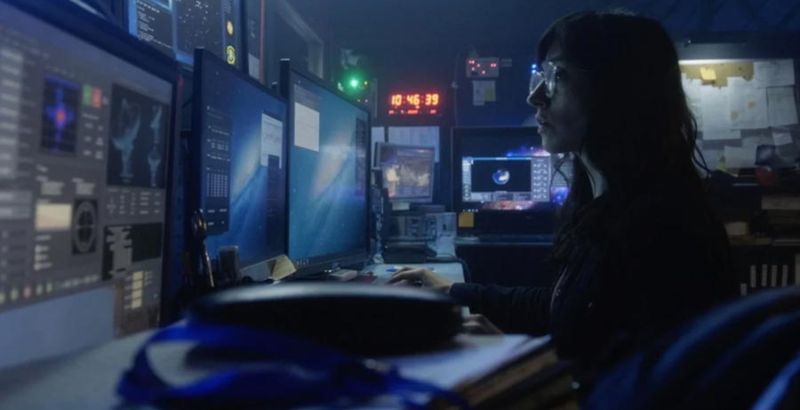
The Antares Paradox was not what I was expecting – but that works in its favor. The Spanish-language film centers on Alexandra Baeza (Andrea Trepat), a scientist working to reveal the proof of extraterrestrials. And her hard work is about to pay off, as she’s finally received what appears to be a message from an alien civilization. But multiple obstacles stand in her way. The higher-ups dismiss her findings as a mere anomaly. She only has until midnight before her access to the telescopes ends. A brutal storm threatens to cut off power to her instruments. And the cherry on top of the horror sundae: her father Manel (Jaume de Sans) is lying at death’s door and is asking for her.
The titular “paradox” refers to the struggle Alexandra faces. Does she continue to pursue her lifelong dream, or does she listen to everyone else and put it aside? It’s a struggle that propels the entire film and provides a great source of conflict. Chasing your dreams is a risky prospect. People will tell you to give up or to find something more sensible, and there are obstacles both financial and emotional to overcome. Alexandra goes through all of that, as her dedication to her job has fractured her relationship with her sister Ana (Aleida Torrent) and her colleagues have left for more prestigious positions. But she soldiers on, even as the emotional weight takes its toll.
And I do mean emotional. Trepat delivers an amazing performance in this film; it literally opens with her breaking down and sobbing, which almost made me cry. She also delivers a passionate speech in the film’s closing moments, pouring out her heart to one character. It’s enough to overpower my unease about the ending, which ends on a note that will more than likely divide readers. What makes Trepat’s performance all the more impressive is that The Antares Paradox is essentially set in a single location. Most of the chats with other characters take place over the phone or via video chat but trust me when I say that these pack more emotional charge than your usual Zoom sessions.
The other impressive thing about Antares is that it’s more of a science drama than science fiction. Plenty of science fiction films were part of this year’s Fantastic Fest lineup. Still, Antares shows Alexandra doing the work: double and even triple checking her calculations and going through the process of talking to her higher-ups. Having seen plenty of big blockbusters and other science-fiction films where the focus was more on fiction, it’s a welcome change of pace. It’s also very educational – after watching the film, I googled SETI (the laboratory Alex works at) and learned that it’s a real place. Writer/director Luis Tinoco clearly did his homework.
And he did a great job, considering this is his directorial debut. Tinoco is best known for his visual effects work on other films – the most recent being Prey – and he puts that expertise to good use. Quick shots reveal a storm raging outside, and then videos of Alexandra’s father. Another scene features the power going out, with a loud blaring alarm raising tension as Alexandra struggles to save her work. And throughout the film, a montage shows her pulling cards from a message board as she goes through the process of confirming the signal. Tinoco also shows that he’s a master of pacing, as the film unspools at a steady pace while still keeping viewers hooked. Very few directorial debuts manage that, but the fact that he succeeds is yet another impressive feat.
The Antares Paradox delivers a mix of scientific breakthroughs and emotional conflict, resulting in one of the boldest directorial debuts of the year. Tinoco’s a great filmmaker in the making, and hopefully, his next film will be just as compelling.
The Antares Paradox had its world premiere at Fantastic Fest 2022.
The Antares Paradox
-
Rating - 8.5/108.5/10
TL;DR
The Antares Paradox delivers a mix of scientific breakthroughs and emotional conflict, resulting in one of the boldest directorial debuts of the year. Tinoco’s a great filmmaker in the making, and hopefully, his next film will be just as compelling.






